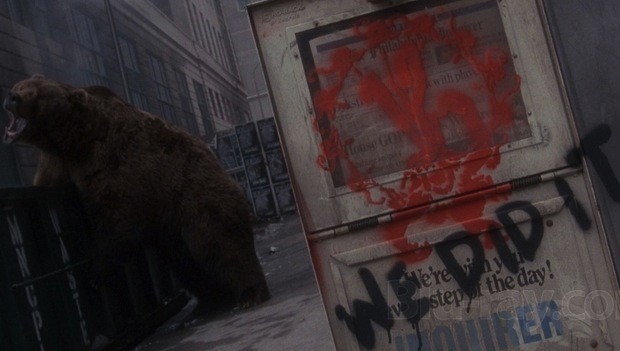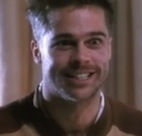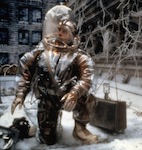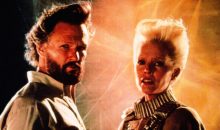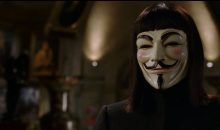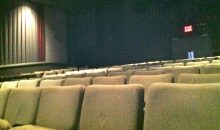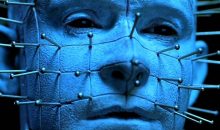12 Little Monkeys, Sitting in a Tree
This column has only been running for two months; is it too early to need to “take it back to its roots”? Whatever; here’s a review of a movie from 1995.
I’ll tell you a secret: 1995 me hated Brad Pitt. With a passion. At the time, Brad Pitt was deep in the throes of his pretty-boy era (think Legends of the Fall) and not even brooding Interview With the Vampire Brad Pitt or Se7en Brad Pitt could slake my hatred.
It took all the might of Terry Gilliam to convince me that Brad Pitt could act, and in 12 Monkeys, act he does. With one single movie, I became a Brad Pitt cheerleader, and the subsequent movies where he riffed off his unhinged character first discovered in 12 Monkeys further solidified my admiration for the man. Without Jeffery Goines, the psychotic son of a scientist Pitt plays in 12 Monkeys, there’s be no Tyler Durden (Fight Club), no One-Punch Mickey (Snatch), and no Aldo Raine (Inglorious Basterds).
It’s interesting to review 12 Monkeys in 2014. Released nearly 20 years ago in 1995, the movie features all the anachronisms you’d expect from a movie alternately set in 1990, 1996, and 2035: radios, corded telephones, pagers, CRT televisions, simplistic airport security, and cops that arrive on scene within five minutes of being called. Stars Bruce Willis and Brad Pitt have been Hollywood A-listers for decades, Madeline Stowe has been enjoying a successful television carer, and Terry Gilliam is as much of a Hollywood Elder Statesman as Steven Spielberg or Clint Eastwood. Yet in 1995, Bruce Willis’s career featured as many downs and ups (This is a man who starred in Pulp Fiction and Hudson Hawk in the same decade), while according to Wikipedia, “Pitt was cast for a comparatively small salary, as then he was still relatively unknown.” Let that sink in for a moment. There was a time, not so long ago, where Brad Pitt was an unknown. 1995 me would have wished we could have lived in that time forever.
Terry Gilliam followed up 12 Monkeys with the amazing Fear and Loathing in Las Vegas, and both movies showcase his talents as both a director and a human being whose imagine I can only guess is as large as a Stephen King novel. In 12 Monkeys, Gilliam explores the idea of a future that isn’t dystopian in the sense of totalitarian, just really really dirty. Mankind is all but extinct, thanks to a virus that wiped out 99% of the population, and the remaining 1% live underground. Prisoners, such as Willis’s James Cole, are voluntold for missions to the surface to collect specimens, so that scientists can figure out how to reclaim Earth for humanity. One of the more dangerous missions involves going back in time to figure out just how in the hell humans managed to cock things up so badly.
Only things don’t go so well for Cole during the time-travel mission. First sent to 1990 instead of 1996, he’s befriended by both his psychiatrist (Stowe) and a Goines (Pitt), both of whom he meets again once the scientists are finally able to send him to 1996 so he can do his job. This plot point does a masterful job of pointing out the irony of the scientists’ plan: they want to figure out what went wrong so they can fix it, but they can’t even figure out how to do their job properly in the first place.
12 Monkeys is based on a short French film called La Jetée, which I highly recommend watching also, as many of the concepts from that film are fleshed out in 12 Monkeys. Writer David Peoples is able to expand the initial ideas first presented in the source material, and realize them in a way the original never could. Peoples is no stranger to such artistry; thirteen years before 12 Monkeys he took an oddly titled novel and transformed it into Blade Runner.
So, to recap, 12 Monkeys features the stars of Die Hard and Fight Club, was written by Blade Runner’s screenwriter, and directed by one of the original members of Monty Python. It’s a haberdashery of greatness that turned in one of the most satisfying movies about time travel that isn’t Primer.
tl;drs
Blank is a blanker version of blank: 12 Monkeys is a modern retelling of the story of Cassandra.
Screen credits over/under: Under: two people wrote the screenplay and one of them is the guy who wrote Blade Runner.
Recommended if you like: watching Terry Gilliam succeed once in a while.
Better than I expected: The movie holds up well after 20 years, and its refreshing to see real animals in movies, instead of CGI lions, tigers, and bears.
Worse than I hoped: The film drags a bit, and the ending gives you the feeling the writers were hoping for a sequel, which so far has yet to appear.
12 Monkeys would work better as a(n): I’ll be curious to see how the upcoming television series is gonna work; Gilliam certainly created a world large enough to explore on TV.
Verdict: Bruce Willis, Brad Pitt, and Terry Gilliam are all at the top of their game here; check it out.

